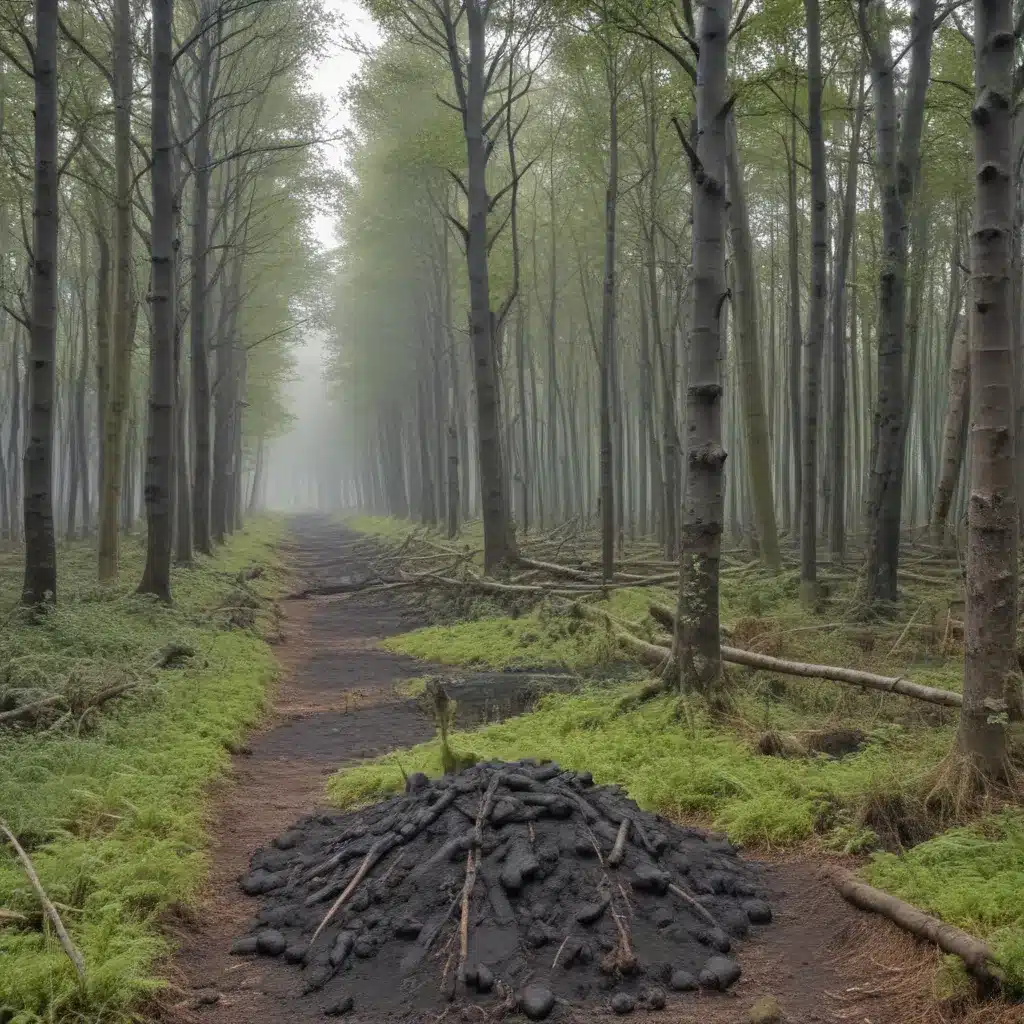The UK’s charcoal industry has long been linked to the deforestation of woodlands and forests around the world. We learned this the hard way when dealing with challenging terrain during harvests… As global demand for charcoal continues to rise, the environmental impact of this industry has become a significant concern. Fortunately, a growing number of innovative reforestation initiatives are working to mitigate the damage and promote more sustainable forestry practices.
Environmental Concerns
The production of charcoal from wood is a major driver of deforestation, particularly in regions with high-demand markets like the UK. As forests are cleared to meet the need for charcoal feedstock, the delicate ecosystems they support are disrupted, leading to a loss of biodiversity, soil degradation, and increased greenhouse gas emissions.
These environmental impacts ripple far beyond the immediate areas of deforestation. The loss of forests can disrupt regional weather patterns, contribute to desertification, and compromise the ability of natural landscapes to act as carbon sinks. The consequences are felt globally, as deforestation accounts for around 10-15% of annual human-caused greenhouse gas emissions.
Charcoal Production
Charcoal is produced by the pyrolysis (heating in the absence of oxygen) of various types of wood. Traditional production methods often involve inefficient kilns or pits that release significant amounts of particulate matter and other pollutants into the environment. The charcoal is then transported, often over long distances, to reach consumer markets.
This supply chain has a substantial carbon footprint, with emissions generated from harvesting, processing, and transporting the charcoal. Additionally, the unsustainable harvesting of wood can deplete natural forests, leading to a cycle of environmental degradation.
Reforestation Efforts
In response to these challenges, a growing number of reforestation initiatives have emerged, focused on restoring degraded landscapes, promoting sustainable forestry practices, and sequestering carbon through strategic tree planting. These efforts aim to address the root causes of deforestation and provide a more eco-friendly alternative to traditional charcoal production.
Afforestation Programs
One key approach is the establishment of afforestation programs, which involve planting trees in areas that were previously deforested or never contained forests. These initiatives often focus on fast-growing, resilient tree species that can quickly establish themselves and provide a sustainable source of wood for charcoal production.
Sustainable Forestry Practices
In addition to afforestation, many reforestation efforts also emphasize the importance of sustainable forestry practices. This includes techniques such as selective harvesting, where only certain trees are removed from a forested area, and coppicing, which involves the repeated cutting of trees at the base to encourage new growth.
These methods help to maintain the overall health and productivity of the forest, ensuring that it can continue to provide a renewable source of charcoal feedstock while also preserving the ecological integrity of the ecosystem.
Carbon Sequestration
Another key aspect of reforestation initiatives is their potential to sequester carbon from the atmosphere. As trees grow, they absorb and store CO2, effectively removing greenhouse gases from the air and mitigating the overall environmental impact of charcoal production.
By integrating these carbon-sequestering trees into the charcoal supply chain, reforestation efforts can help to offset the emissions generated during the production and transportation of the final product.
UK Charcoal Industry
The UK’s charcoal industry is a significant consumer of global charcoal supplies, with the country importing the majority of its charcoal from overseas sources. This reliance on imported charcoal has contributed to the deforestation challenges faced in producer regions.
Production Processes
Within the UK, the production of charcoal is often carried out using traditional methods, such as retort kilns or pit kilns. These processes can be highly inefficient, with significant energy and material losses, as well as the release of air pollutants.
Supply Chain Challenges
The charcoal supply chain in the UK also faces a number of logistical challenges. Securing a reliable and sustainable source of wood feedstock can be difficult, particularly as deforestation continues to deplete natural resources. Additionally, the transportation of charcoal over long distances can add to the industry’s overall carbon footprint.
Market Demand
Despite these challenges, the demand for charcoal in the UK remains strong, particularly for use in barbecues, fireplaces, and other domestic applications. This ongoing market demand has placed significant pressure on the industry to find more sustainable solutions.
Environmental Sustainability
To address the environmental concerns associated with the UK’s charcoal industry, reforestation initiatives have become increasingly important. These efforts aim to not only restore degraded landscapes but also to promote more sustainable forestry practices and enhance the overall carbon sequestration capabilities of the affected regions.
Emissions Reduction
By integrating reforestation into the charcoal supply chain, the industry can work to reduce its overall emissions. The carbon absorbed by the growing trees can help to offset the greenhouse gases released during the production and transportation of charcoal.
Biodiversity Conservation
In addition to emissions reduction, reforestation initiatives also play a crucial role in biodiversity conservation. By restoring and maintaining healthy forest ecosystems, these programs help to protect the diverse array of plant and animal species that depend on these habitats.
Circular Economy
The adoption of reforestation strategies within the charcoal industry also supports the transition to a circular economy. By ensuring a renewable and sustainable source of feedstock, the industry can reduce its reliance on virgin resources and move towards a more closed-loop, resource-efficient model.
Overall, the reforestation initiatives tackling the environmental impact of the UK’s charcoal industry represent a promising step towards a more sustainable future. By integrating these approaches into the supply chain, the industry can work to mitigate its environmental footprint, promote biodiversity, and contribute to the broader goals of emissions reduction and climate change mitigation.
Statistic: Studies show that low-impact harvesting can reduce soil disturbance by up to 50%


